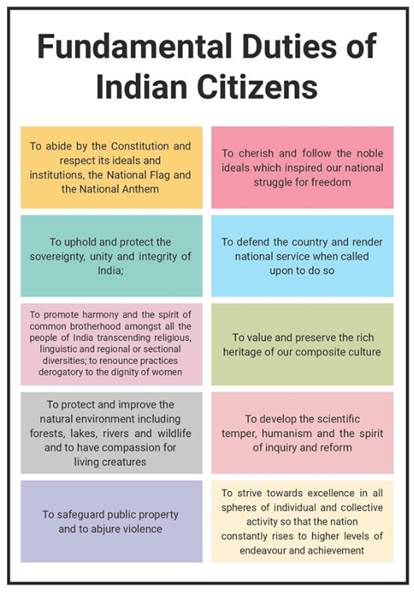Description

Copyright infringement not intended
In News
- Recently the Chief Justice of India has stated that the fundamental duties mentioned in the Indian Constitution are not just to serve a "pedantic or technical" purpose, but they are meant to guide citizens to bring social transformation.
- He highlighted that "Our Constitution is the fundamental document which regulates the relationship between the citizens and the government. While it has granted us inalienable rights, it places upon us certain fundamental duties”.
Fundamental Duties
- The original constitution contained only the fundamental rights and not the fundamental duties.
- Fundamental duties under Article 51A were added by the 42nd Amendment.
- They were included under Part IV-A of the Constitution on the recommendations of the Swaran Singh Committee.
- Originally 10 in number, increased to 11 by the 86th Amendment.
- The Fundamental Duties in the Indian Constitution are inspired by the Constitution of the USSR.
- None of the Constitutions of major democratic countries like the USA, Canada, France, Germany, Australia and so on specifically contain a list of duties of citizens.
- The Japanese Constitution is, perhaps, the only democratic Constitution in the world which contains a list of duties of citizens.
- Some of the Fundamental Duties are moral duties while others are civic duties.
- They reflect the values of the Indian tradition, mythology, religions and practices.
- Unlike Fundamental Rights, the Fundamental Duties are confined to citizens only and do not extend to foreigners.
- Like the Directive Principles, the fundamental duties are also non-justiciable. The Constitution does not provide for their direct enforcement by the courts.
- There is no legal sanction against their violation. However, the Parliament is free to enforce them through legislation.

List of Fundamental Duties
- To abide by the Constitution and Respect its ideals and institutions, the National Flag and the National Anthem.
- To cherish and follow the noble ideals which inspired our national Struggle for freedom.
- To uphold and protect the sovereignty, unity and integrity of India.
- To defend the country and render national service when called upon to do so.
- To promote harmony and a spirit of common brotherhood amongst all people of India transcending religious, linguistic and regional or Sectional diversities; to renounce practices derogatory to the dignity of women.
- To value and preserve the rich heritage of our composite culture.
- To protect and improve the natural environment including forests, lakes, rivers, and wildlife and to have compassion for living creatures.
- To develop the scientific temper, humanism and the spirit of inquiry and reform.
- To safeguard public property and to abjure violence.
- To strive towards excellence in all spheres of individual and collective activity, so that the nation constantly rises to higher levels of endeavour and achievement.
- A parent or guardian, to provide opportunities for education to his child between 6 to 14 years of age. (Added by the 86th Constitutional Amendment Act of 2002).

Copyright infringement not intended
Significance of the Fundamental Duties
- They serve as a reminder to the citizens that while enjoying their rights, they should also be aware of the duties they owe to their society and their country.
- They serve as a warning against anti-national and antisocial activities like burning the national flag, destroying public property and so on.
- They serve as a source of inspiration for the citizens.
- They create a feeling that the citizens are active participants in democracy.
- They help the courts in examining and determining the constitutional validity of a law.
- They are enforceable by law. Hence, the Parliament can provide for the imposition of penalty or punishment for failure to fulfil any of them.
Way forward
- The need of the hour is to remind citizens that fundamental duties are as important as fundamental rights under the Constitution.
- The time has come to balance rights, liberties and freedoms, and Fundamental duties.
https://www.thehindu.com/news/national/fundamental-duties-are-not-just-pedantic-they-are-key-to-social-transformation-cji/article65771369.ece
https://t.me/+hJqMV1O0se03Njk9














